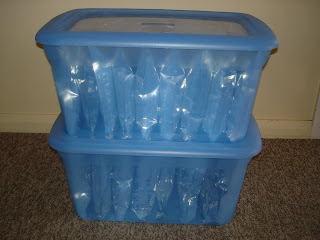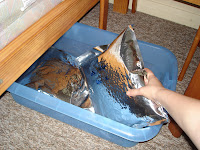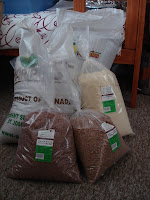It's Summer - Watch out for spoilage!
Regardless of where you buy your food, the warm conditions in summer usually bring some sort of spoilage. I'm talking moths and weevils!
If you are unable to store them adequately (read below) then it may be more practical to buy those items in smaller amounts or split large bags with friends. This way you'll be eating what you need within the month and have less likelihood for spoilage.
However, if you do have a large fridge, freezer of any kind or access to oxygen absorbers, things will be a little easier.
Here are the most common culprits and the signs:
MEAL MOTHS - Small, slim grey moths. You may find adult moths flying out of your container, munching evidence, tiny white grubs, webbing (any grains that look like they're sticking together when you roll the container around to look).
 Treatment
Treatment - Prevent them! Wipe down shelves with hot water. I use a wet Norwex cloth to make sure I'm picking up all the unseen bits and pieces. Ensure all food is stored in air-tight containers before returning to the cupboard. Even gaps of 3mm can enable them to wiggle through and lay eggs.
NEVER keep opened packets or bags of food in your cupboard. ALWAYS keep in air tight containers. Some say freezing packets kills the eggs. I haven't seen any evidence to support this.

WEEVILS - Little black insects that eat their way out of your grain and other foods. Like moth larvae, they will already be in some foods before waiting for the best conditions to hatch.
Signs of weevils are if your grain feels dusty, you see holes or damage to your food, or you see the insects inside the container. Another method of finding weevil eggs is to immerse them in water. If they float to the surface, it is a good indication of egg infestation (for heavy grain like wheat or rice).
Treatment - It depends how you feel.. Some people are fine to just pick them out and keep going (like us with popcorn, we stick it in the machine and the weevils always shoot out first so we get rid of them before the corn comes out! haha).
Others freak out and want to chuck the entire bag of food.Chooks will be happy in this case.
The Bad and the Good News:
The bad news is, most of the dry whole foods that we eat, whether they are organic or conventional, Australian grown or imported, area already infested with eggs. They always have been! I worked at Sanitarium some time ago and one of the managers there told me just that. It's all just a matter of time.
The good news is, they only come out when conditions are suitable for them. So we have a good chance of preventing an out break or suffocating the bugs, depending on which storage method we use.
So, we know that if we keep them stored in airtight containers, in a
cool dry place we will have better luck than leaving them in a warm
hutch with clear container.
My own personal methods of food preservation vary from the
scientifically proven, personally proven, and "seem good for now".
Scientifically proven - Foil pouches with oxygen absorbers (long term) or airtight containers with oxygen absorbers (shorter term). Oxygen absorbers are a once only use item. If you're using jars, tubs, buckets with lids etc you will have about 10mins to stick them in all of your buckets etc before closing the lid. Once spent they feel rusty, crunchy and hard inside. Seal them quickly in a small airtight container or seal up in a vacuum sealer bag to save for later use.
The wonderful, wonderful benefit of doing it this way with oxy abs are that they suffocate the bugs and eggs killing - without the use of chemicals or fuss all living creatures inside the pack. It does not effect the sprouting capabilities of the grains. I've successfully sprouted wheat that has been stored in a foil pouch with oxy ab for over 6 years.
 Personally Proven
Personally Proven - I freeze whatever nuts and seeds I can. I only have a small freezer above my fridge but still manage to get a big tub of almonds (2.5kg) and all of my alfalfa, sunflower and sesame seeds in there. I can scoop them out as needed. I do still have all the other gaff in there, it's not all seeds and nuts! Plenty of room left :) I keep half of the almonds out in my cupboard as I'll use them over the next couple of months. The container feels cool when I get it out, so I know the spot is a good one. Never had any troubles with that.
Store them DOWN, not up. Storing at the top of a cupboard is the warmest place and more likely to encourage outbreaks.
I feel that the freezer is ok to store them in while they're waiting to be the "using now" container. BUT I don't believe that freezing them in a home freezer for a week is long enough or cold enough to kill eggs or larvae. The world has winters! These bugs survive. If you want to go that extra mile, try asking a mate who has a commercial freezer and leave the goods in there for a week, or even two. You'll have better chance than a home freezer that's for sure.
 |
| (not my freezer.. too organised) |
"Good for now" (until something bad happens) - 4 years ago when I was about to pop with child number two, I had a stack of rolled oats that I was too tired to foil pack away. I bagged them up in 2 kilo amounts, put a few unpeeled cloves of garlic and bay leafs in there and layered a bucket with an airtight lid.
A few years later, I found the buckets and there were no sign of bugs, outbreaks or infestations.
Now hang on!! This doesn't really mean as much for rolled or quick oats as they're cooked. Steam is used to roll oats and quick oats are even further steamed and processed. So they are less likely to have live eggs in them anyway - unless they got inside from somewhere else while in your house.
BUT I've tried this method recently with some of that gorgeous biodynamic rain fed brown rice we buy. The stuff packed in buckets in a cool spot in the laundry, with garlic cloves is fine. The box on my kitchen bench is a festy weevil party in a box. I know, I know, other factors at play there. This is why it's under "good for now". :)
OTHER SOLUTIONS for
items with less than 10% oil/moisture content - I have two,
1. Keep
higher risk items in the freezer until ready to use (Organic nuts/seeds,
whole grains, polenta etc)
2. Store in air tight containers (or
foil pouches for longer term storage) with oxygen absorbers - for those items
you're not using every day. The open packet/box, use from the freezer
if you can.
 HERE
HERE is a list of some basic safe foods, scroll down for a list of non-safe foods for anaerobic conditions (without oxygen).
Please note, Quinoa, nuts, dried fruit, brown rice, pearled barley and millet are NOT suitable for use with oxygen absorbers.
(This woman is probably thrilled that she's foil pouched her legumes and can fit all of her brown rice, nuts and meal time left overs in the freezer!)
*This is a guide, buy product and store it at your own risk.













